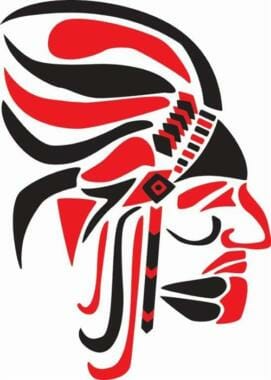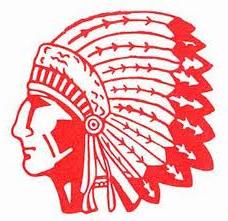
Wasilla High School’s headdress-wearing warrior logo is being revisited in consultation with the local Knik Tribe, but the school’s principal says that he’s facing pushback from two sides.
On one side are those who say that the warrior logo is a proud tradition for alumni, while on the other are those who say any Native American logo is problematic.
Jason Marvel, the principal at Wasilla High, said he has long seen the logo as an issue. Marvel became principal in 2019, and has also worked as a teacher and sports coach for years. He said he has seen some racist behavior associated with the team’s mascot.
“When I was a basketball coach,” he said, “at the end where the tomahawk, you know, (is) coming down … when you beat a team.”
That tradition was abandoned a few years ago, Marvel said. But he still had concerns about the logo, and that led him to contact the Knik Tribe last fall.
However, a series of missed phone calls over the winter and then the COVID-19 pandemic meant that they didn’t make any progress, he said.
Then, a few weeks ago, an online petition asking for the reexamination of the logo surfaced. It gathered more than 1,000 signatures. On July 3, Marvel posted on the school’s Facebook page that the school was looking at reworking the logo, and a firestorm of angry comments ensued.
“We had school board members, we had representatives of the Valley commenting on it saying, ‘Oh, my gosh,’ He said. “And then we had people, people on both sides of the spectrum are commenting.”
After the weekend, he clarified to say that the process had started long before the online petition, and that the warrior mascot would remain, but that the school would use a more “appropriate and culturally responsive” logo.
Wasilla’s current logo was designed by a former student of mixed Korean and American Indian descent, according to Marvel. It was designed just a few years ago to replace the previous image, which used more stereotypical imagery of a Native American in a headdress. That one is still used on older sports apparel and is found throughout the school.

The issue of sports teams mascots has entered the national political stage, most recently when President Donald Trump tweeted in opposition to renaming Washington’s NFL team, which is an offensive racial slur, and Cleveland’s baseball team, the Indians. (On Monday, Washington’s NFL franchise dropped its team name.) In Wasilla, where 70% of voters voted for Trump, Marvel said he knew he was entering sensitive territory.
“I live in a very conservative community and we have conservative values and I do want to honor those,” he said.
But Wasilla High is also the most diverse in the district, which has slowly seen an increase in diversity and now is about 80% white.
For its part, the Knik Tribal Council has been supportive of the changes and appreciative of the opportunity for consultation.
Richard Porter, the executive director of the tribe, said he was encouraging of that sort of dialogue.
“When you work together and you really have the opportunity to take any kind of demonization that you had out of each other and start taking steps toward each other things like this happen,” he said.
Porter said that the tribe has worked for years to increase recognition of the Dena’ina of the Knik area, who once numbered 10,000 to 20,000. He’s seen progress, such as with land acknowledgment placards that are being installed in schools throughout the district.
But after the announcement that his tribe was being consulted on the logo re-design, he said he’s heard more criticism from those who say that changing the image of the warrior mascot isn’t enough if it still features a caricatured Dena’ina warrior. He said he doesn’t buy those criticisms, and says that other races are also caricatured, such as the Colony High School’s logo, the Knights.
In any case, the school is pushing forward with something that is less controversial: installing a piece to honor Chief Wasilla, after whom the school and the city is named.
Marvel said the school is applying for federal grants to hire a local Dena’ina artist to do that work in consultation with the Knik Tribe.